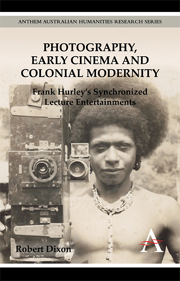Book contents
- Frontmatter
- Contents
- List of Illustrations
- List of Abbreviations
- Acknowledgements
- Introduction
- Chapter One The Home of the Blizzard: Douglas Mawson's Synchronized Lecture Entertainment
- Chapter Two Guided Spectatorship: Exhibiting the Great War
- Chapter Three Touring the Nation: Shackleton's ‘Marvellous Moving Pictures’ and the Australian Season of In the Grip of the Polar Pack-Ice
- Chapter Four Entr'acte: Sir Ross Smith's Flight, Aerial Vision and Colonial Modernity
- Chapter Five Colonial Modernity and Its Others: Pearls and Savages as a Multimedia Project
- Conclusion
- Notes
- Bibliography
- Index
Chapter Three - Touring the Nation: Shackleton's ‘Marvellous Moving Pictures’ and the Australian Season of In the Grip of the Polar Pack-Ice
Published online by Cambridge University Press: 05 May 2012
- Frontmatter
- Contents
- List of Illustrations
- List of Abbreviations
- Acknowledgements
- Introduction
- Chapter One The Home of the Blizzard: Douglas Mawson's Synchronized Lecture Entertainment
- Chapter Two Guided Spectatorship: Exhibiting the Great War
- Chapter Three Touring the Nation: Shackleton's ‘Marvellous Moving Pictures’ and the Australian Season of In the Grip of the Polar Pack-Ice
- Chapter Four Entr'acte: Sir Ross Smith's Flight, Aerial Vision and Colonial Modernity
- Chapter Five Colonial Modernity and Its Others: Pearls and Savages as a Multimedia Project
- Conclusion
- Notes
- Bibliography
- Index
Summary
In the last of his diaries from the Great War, Frank Hurley recorded his final, hectic days in London in July 1918. From his rooms at the Imperial Hotel in Russell Square, exhausted and ill with influenza, he was coordinating preparations for the AIF's exhibition of war photographs at the Grafton Galleries. At the same time, he was negotiating to secure distribution rights for three films of Antarctic exploration: his own films of Mawson's Australasian Antarctic Expedition and Shackleton's Imperial Trans-Antarctic Expedition, and Herbert Ponting's film of Scott's British Antarctic Expedition. ‘I am keenly anxious to leave,’ Hurley wrote, ‘…but the securing of these films should enable me to form the nucleus of a considerable business in Australia, and so I am doing my utmost to drive a bargain.’ After several years playing second fiddle to Mawson and Shackleton, Ponting, Castle and Bean, this would be the start of Hurley's career as a platform personality in his own right. In this chapter I examines Hurley's emergence as an independent show business entrepreneur, and how he set up that ‘considerable business’ in Australia after the war. It all began with his national tour of In the Grip of the Polar Pack-Ice in the Australian summer of 1919–20.
Exploiting Polar Exploration
Despite their sometimes nominal connections with institutions like the Admirality and the Royal Geographical Society, and with the British, Australian and New Zealand governments, the polar expeditions of the so-called classic era were in fact funded from a variety of sources, including private patronage, commercial sponsorship, and advances for the rights to books, photographs, newspaper articles and films.
- Type
- Chapter
- Information
- Photography, Early Cinema and Colonial ModernityFrank Hurley's Synchronized Lecture Entertainments, pp. 109 - 146Publisher: Anthem PressPrint publication year: 2012

